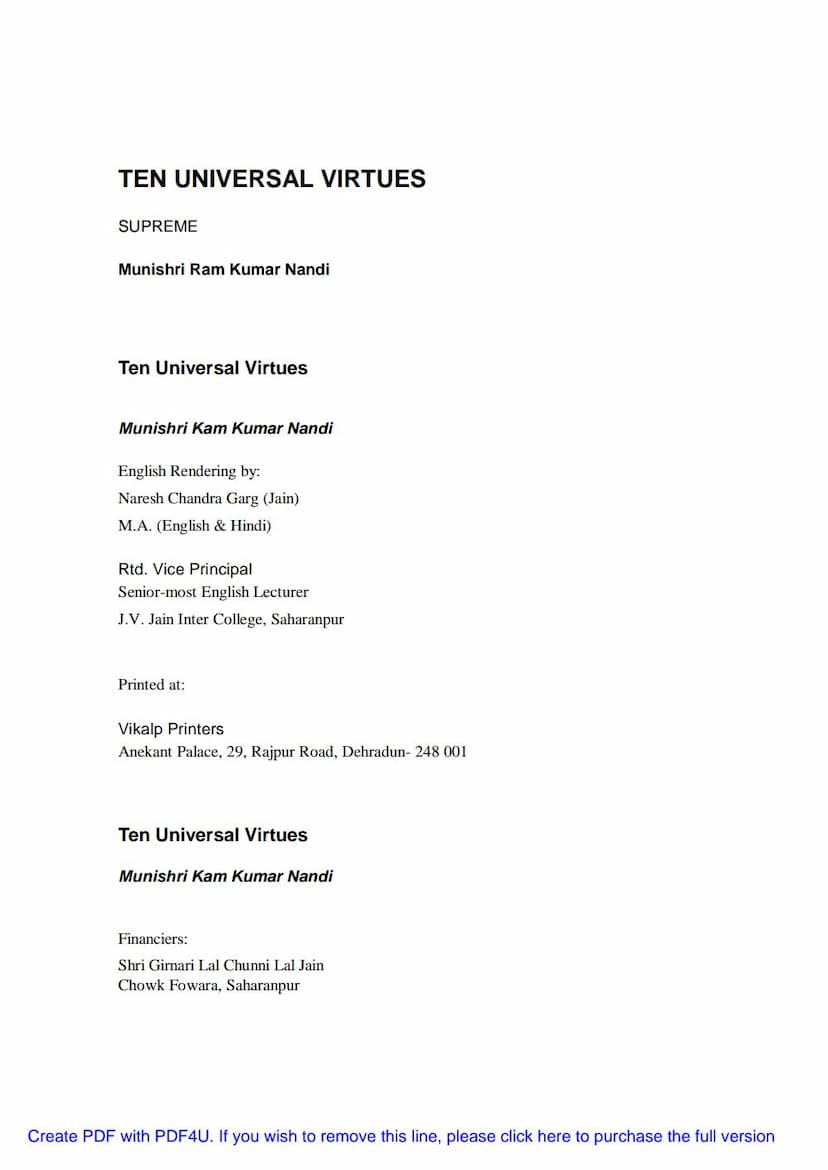Ten Universal Virtues
Added to library: September 2, 2025

Summary
This document provides an English translation of "Ten Universal Virtues" by Munishri Ram Kumar Nandi, rendered by Naresh Chandra Garg. The book delves into the core principles of Jainism, presented as ten supreme virtues that guide spiritual upliftment and ultimate liberation (Moksha).
The author, Munishri Kam Kumar Nandi, a young Jain monk, expounds upon these virtues through sermons, drawing from Jain scriptures and everyday life examples. The English rendering aims to convey the profound message of Jainism to a wider audience, emphasizing its relevance in the modern, materialistic world.
Key aspects of the book include:
- Author's Background: Munishri Kam Kumar Nandi's biographical details are presented, highlighting his early renunciation and dedication to spiritual practice.
- The Ten Universal Virtues: The book meticulously details each of the ten virtues, providing their Sanskrit names, English equivalents, and in-depth explanations of their practice and significance. These virtues are:
- Uttama Kshama (Supreme Forgiveness): Emphasizes tolerance, abandoning anger, and pardoning others.
- Mardava (Supreme Tenderness or Humility): Focuses on eradicating pride and ego, promoting gentleness and humility.
- Arjava (Supreme Uprightness or Honesty): Stresses straightforwardness, sincerity, and avoiding deceit in thought, word, and deed.
- Shaucha (Supreme Contentment or Purity): Advocates for discarding greed and maintaining inner and outer cleanliness.
- Satya (Supreme Truthfulness): Highlights the importance of speaking beneficial, affectionate, and truthful words, even prioritizing truthfulness over seemingly true but harmful statements.
- Sanyam (Supreme Self-Restraint): Discusses controlling the five senses and mind to achieve inner peace and prevent the influx of negative karma.
- Tapa (Supreme Austerities or Penance): Explains both external (fasting, seclusion) and internal (study, repentance, meditation) austerities as means to purify the soul and overcome karmic bonds.
- Tyaga (Supreme Renunciation): Emphasizes the importance of charity (food, fearlessness, medicine, knowledge) and detachment from worldly possessions.
- Akinchanya (Supreme Non-attachment): Focuses on limiting desires and ambitions, and recognizing the self as distinct from non-self (material objects).
- Brahmacarya (Supreme Chastity): Promotes sexual purity and dedication to the soul, presenting it as the pinnacle of virtues.
- Paryushan Parva: The book connects the observance of these ten virtues to the annual Jain festival of Paryushan, often called the "Festival of Self-Uplift," highlighting its role in self-purification and spiritual growth.
- Diverse Perspectives: The text references various Jain scholars and scriptures, providing multiple interpretations and examples to illustrate each virtue. It also includes comparisons with other religious philosophies.
- Ethical and Spiritual Guidance: The overarching theme is the transformative power of these virtues in individual lives and their potential to bring peace and harmony to a strife-torn world. The book encourages practical application of these principles for personal and societal well-being.
- Epilogue (Kshamaavani Parva): The book concludes with an explanation of the "Forgiveness Festival," which marks the culmination of the Paryushan celebrations, reinforcing the paramount importance of forgiveness in Jainism.
In essence, "Ten Universal Virtues" serves as a comprehensive guide to the ethical and spiritual framework of Jainism, offering profound insights into cultivating virtues for a meaningful and liberated life.